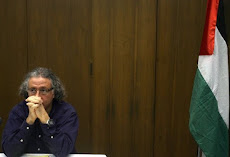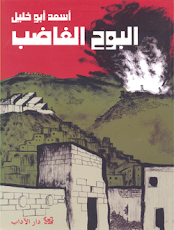Comrade Khaled today replies to comrade Kamal:
"1. 'Afeef El-Bizri was a captain at the time. He was dispatched to France for higher degrees (Mathematics), and attended later the French Staff College in Military Engineering to return as Commander of the Artillary Corps and later Premiere Bureau.
2. Salah El-Bizri was a Lt. Col and headed of the Deuxième Bureau before and after General 'Husni Al-Za'eem's dictatorship while out of it for the period of the rule of Za'eem. He stated to me that he conducted personally the interrogation of General Hinnawi who was released later. The son and the daughter of General Hinnawi seem to think as they told me in Aleppo in the 1980s, that he 'organized' the assassination of their father, although the murderer was a relative of the Muhsin Al-Barazi, the Prime Minister revenging his death, and Col Salah El- Bizri was then in the Mezzah prison by orders of Mr. Shishakli, who told him upon his capture "You are too dangerous to be stay free!" Salah El-Bizri told me Shishakli was probably referring to his close bond with his fellow officers before he resigned first in 1949, a bond that remained, it seems, to the rest of his life.
3. Neither of them belonged to the Syrian Bizreh (with an h) family. Both were born in Lebanon: Merj 'youn for Salah and Seida for 'Afeef. They are Bizris with an 'i.' That they ended in Damascus was, I am informed, because their father, a Taleb Bey El-Bizri, a judge, served his last days heading a Damascene Court during the latter days of the Ottoman rule in Damascus.
4. Col Nasser was not tried. He was shot dead. It is therefore not appropriate to accept accusations made by Shishakli, who murdered him, and ignore the sentiments of the officers who toppled Shishakli, which suggests differently. Col Nasser is remembered for his stellar performance in the Palestine Rescue Army جيش الإنقاذ
5. I am really most distressed that rumors spread by the self-same dictator about the Sultan Pasha Al-Atrash, the Commander of the Syrian Revolution against the French. I do not believe any of these accusations were presented at a trial, although one of his descendants I believe was involved in one of the major plots against the democratic regime that came after Shishakli. In the absence of hard facts, these rumors remain rumors and Shishakli was the source of many to justify his bombardment of villages and the death of civilians in Jabal Al-Druze.
The question here is there must have been several currents in Syria seeking to rescue Syria from a state of complete political and military bankruptcy. Shishakli chose the US after he dropped Britain. Al-Za'eem choose France. Others sought Arab unity with Iraq and some, to the consternation of the Nationalist Block, headed mainly by Damascene landowners, fought any attempt by King Abdullah to trap Syria into a Jordanian Kingdom. Some attribute a part of the losses the Arab Armies suffered in the Palestine War to Mr. Al-Quwatly's distrust of the King. A distrust that may well be appropriate but it stood in the way of several operations in which the Jordanian Army were prepared to undertake to support the Syrians.
But these and other developments speak more of the dominance in Syria's political life at the time of a strong feelings (fed by the Allied) against the Soviet Union and the Socialist Countries, and supported by all the main political parties - mostly on the grounds that Socialists and Communists are atheists who would require their subjects to be atheists!
Once this taboo was broken, and the hold of the right-wing political parties was limited by the massive upsurge in popular demands as seen in the famous elections following the Collapse of the Shishakli regime, and the Egyptian-Soviet Arms deal was concluded, a clearer vision was obtained. Today, sadly, some use it in hind sight as a yardstick for the political rectitude, while the question of arms from a communist country must have appeared to some worse than handing over Palestine to the Israelis, while the others were kept away from such a possibility by several ploys. One, however, should not ignore super-power relationships and the readiness of the Soviet Union to challenge the US in its playground - which is an area of investigation.
With that the most urgent question, providing modern arms to the Syrian Army, was resolved. Democracy Syrian-style was established, with the army united through its 'national front,' and limits imposed by popular pressure on the right-wing politicians, whether they represented the landowners (Nationalist Party) or the nascent industrialists particularly in the Northern region of Aleppo (People's Party) or the Saudi-supported (i.e.US supported) religious party (Muslim Brothers). "
"1. 'Afeef El-Bizri was a captain at the time. He was dispatched to France for higher degrees (Mathematics), and attended later the French Staff College in Military Engineering to return as Commander of the Artillary Corps and later Premiere Bureau.
2. Salah El-Bizri was a Lt. Col and headed of the Deuxième Bureau before and after General 'Husni Al-Za'eem's dictatorship while out of it for the period of the rule of Za'eem. He stated to me that he conducted personally the interrogation of General Hinnawi who was released later. The son and the daughter of General Hinnawi seem to think as they told me in Aleppo in the 1980s, that he 'organized' the assassination of their father, although the murderer was a relative of the Muhsin Al-Barazi, the Prime Minister revenging his death, and Col Salah El- Bizri was then in the Mezzah prison by orders of Mr. Shishakli, who told him upon his capture "You are too dangerous to be stay free!" Salah El-Bizri told me Shishakli was probably referring to his close bond with his fellow officers before he resigned first in 1949, a bond that remained, it seems, to the rest of his life.
3. Neither of them belonged to the Syrian Bizreh (with an h) family. Both were born in Lebanon: Merj 'youn for Salah and Seida for 'Afeef. They are Bizris with an 'i.' That they ended in Damascus was, I am informed, because their father, a Taleb Bey El-Bizri, a judge, served his last days heading a Damascene Court during the latter days of the Ottoman rule in Damascus.
4. Col Nasser was not tried. He was shot dead. It is therefore not appropriate to accept accusations made by Shishakli, who murdered him, and ignore the sentiments of the officers who toppled Shishakli, which suggests differently. Col Nasser is remembered for his stellar performance in the Palestine Rescue Army جيش الإنقاذ
5. I am really most distressed that rumors spread by the self-same dictator about the Sultan Pasha Al-Atrash, the Commander of the Syrian Revolution against the French. I do not believe any of these accusations were presented at a trial, although one of his descendants I believe was involved in one of the major plots against the democratic regime that came after Shishakli. In the absence of hard facts, these rumors remain rumors and Shishakli was the source of many to justify his bombardment of villages and the death of civilians in Jabal Al-Druze.
The question here is there must have been several currents in Syria seeking to rescue Syria from a state of complete political and military bankruptcy. Shishakli chose the US after he dropped Britain. Al-Za'eem choose France. Others sought Arab unity with Iraq and some, to the consternation of the Nationalist Block, headed mainly by Damascene landowners, fought any attempt by King Abdullah to trap Syria into a Jordanian Kingdom. Some attribute a part of the losses the Arab Armies suffered in the Palestine War to Mr. Al-Quwatly's distrust of the King. A distrust that may well be appropriate but it stood in the way of several operations in which the Jordanian Army were prepared to undertake to support the Syrians.
But these and other developments speak more of the dominance in Syria's political life at the time of a strong feelings (fed by the Allied) against the Soviet Union and the Socialist Countries, and supported by all the main political parties - mostly on the grounds that Socialists and Communists are atheists who would require their subjects to be atheists!
Once this taboo was broken, and the hold of the right-wing political parties was limited by the massive upsurge in popular demands as seen in the famous elections following the Collapse of the Shishakli regime, and the Egyptian-Soviet Arms deal was concluded, a clearer vision was obtained. Today, sadly, some use it in hind sight as a yardstick for the political rectitude, while the question of arms from a communist country must have appeared to some worse than handing over Palestine to the Israelis, while the others were kept away from such a possibility by several ploys. One, however, should not ignore super-power relationships and the readiness of the Soviet Union to challenge the US in its playground - which is an area of investigation.
With that the most urgent question, providing modern arms to the Syrian Army, was resolved. Democracy Syrian-style was established, with the army united through its 'national front,' and limits imposed by popular pressure on the right-wing politicians, whether they represented the landowners (Nationalist Party) or the nascent industrialists particularly in the Northern region of Aleppo (People's Party) or the Saudi-supported (i.e.US supported) religious party (Muslim Brothers). "








